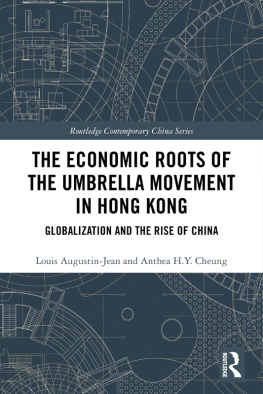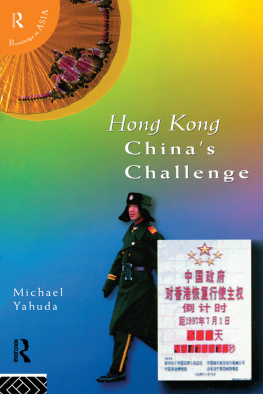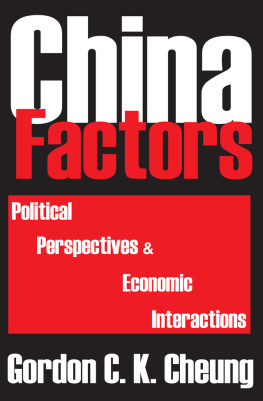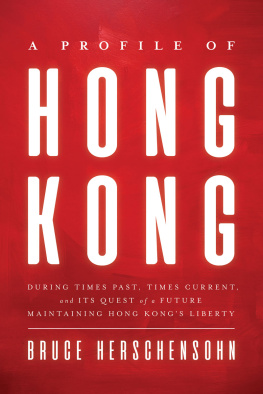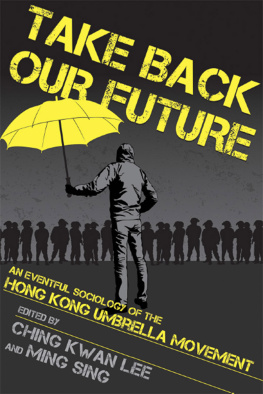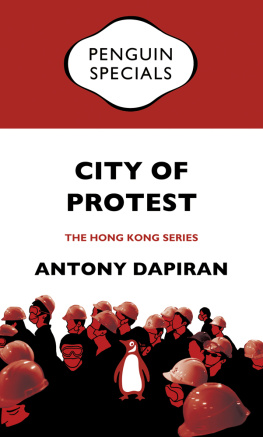The Economic Roots of the Umbrella Movement in Hong Kong
In the autumn of 2014, thousands of people, young and educated in their majority, occupied the chief business district and seat of the government in Hong Kong. The protest, known as the Umbrella Movement, called for genuine democracy, as well as a fairer social and economic system.
The book aims to provide a dynamic framework to explain why socio-economic forces converged to produce such a situation. Examining increasing inequality, rising prices and stagnating incomes, it stresses the role of economic and social factors, as opposed to the domestic political and constitutional issues often assumed to be the root cause behind the protests. It first argues that globalization and the increasing influence of Chinas economy in Hong Kong has weighted on salaries. Second, it shows that the oligopolistic nature of the local economy has generated rents, which have reinforced inequality. The book demonstrates that the younger generation, which is still finding its place in society, has been particularly affected by these phenomena, especially with social mobility at a low point.
Offering a new approach to studying the Umbrella Movement, this book will appeal to students and scholars interested in Hong Kongs political landscape, as well Chinese politics more broadly.
Louis Augustin-Jean is Research Fellow in the Centre for Economic Research, the University of Paris-North (CEPN).
Anthea H.Y. Cheung is Visiting Lecturer in the Department of Chinese and Bilingual Studies at Hong Kong Polytechnic University, Hong Kong.
Routledge Contemporary China Series
For our full list of available titles: www.routledge.com/Routledge-Contemporary-China-Series/book-series/SE0768
The Politics of Memory in Sinophone Cinemas and Image Culture
Altering Archives
Edited by Peng Hsiao-yen and Ella Raidel
Chinas Soviet Dream
Propaganda, Culture, and Popular Imagination
Yan Li
Deng Xiaoping and Chinas Foreign Policy
Ronald C. Keith
Corporate Social Responsibility Reporting in China
Evolution, Drivers and Prospects
Jieqi Guan and Carlos Noronha
Chinas Generation Gap
Jiaming Sun and Dongmei Cheng
China Reclaims World Power Status
Putting an end to the world America made
Paolo Urio
The Economic Roots of the Umbrella Movement in Hong Kong
Globalization and the Rise of China
Louis Augustin-Jean and Anthea H.Y. Cheung
Chinas Hydro-politics in the Mekong
Conflict and Cooperation in Light of Securitization Theory
Sebastian Biba
The Economic Roots of the Umbrella Movement in Hong Kong
Globalization and the Rise of China
Louis Augustin-Jean and Anthea H.Y. Cheung
First published 2018
by Routledge
2 Park Square, Milton Park, Abingdon, Oxon OX14 4RN
and by Routledge
711 Third Avenue, New York, NY 10017
Routledge is an imprint of the Taylor & Francis Group, an informa business
2018 Louis Augustin-Jean and Anthea H.Y. Cheung
The right of Louis Augustin-Jean and Anthea H.Y. Cheung to be identified as authors of this work has been asserted by them in accordance with sections 77 and 78 of the Copyright, Designs and Patents Act 1988.
All rights reserved. No part of this book may be reprinted or reproduced or utilized in any form or by any electronic, mechanical, or other means, now known or hereafter invented, including photocopying and recording, or in any information storage or retrieval system, without permission in writing from the publishers.
Trademark notice: Product or corporate names may be trademarks or registered trademarks, and are used only for identification and explanation without intent to infringe.
British Library Cataloguing in Publication Data
A catalogue record for this book is available from the British Library
Library of Congress Cataloging in Publication Data
Names: Augustin-Jean, Louis, author. | Cheung, Anthea H. Y., author.
Title: The economic roots of the umbrella movement in Hong Kong : globalization and the rise of China / Louis Augustin-Jean and Anthea H.Y. Cheung.
Description: Abingdon, Oxon ; New York, NY : Routledge, 2018. | Series: Routledge contemporary china series ; 185 | Includes bibliographical references and index.
Identifiers: LCCN 2017048637| ISBN 9780815368236 (hardback) |
ISBN 9781351255516 (ebook)
Subjects: LCSH: DemocracyChinaHong Kong. | Protest movementsChinaHong Kong. | Hong Kong (China)Economic conditions. |
Hong Kong (China)Politics and government1987
Classification: LCC JQ1539.5.A91 A94 2018 | DDC 322.4/4095125dc23
LC record available at https://lccn.loc.gov/2017048637
ISBN: 978-0-8153-6823-6 (hbk)
ISBN: 978-1-3512-5549-3 (ebk)
Typeset in Times New Roman
by Wearset Ltd, Boldon, Tyne and Wear
When, in autumn 2014, students occupied Admiralty the business district and the location of the Chief Executive office and started what was not yet known as the Umbrella Movement, journalists and scholars focused mainly on the demands of the protesters namely: the withdrawal of the 31 August 2014 Decision of the National Peoples Congress Standing Committee to grant universal suffrage to Hong Kong, but under a restrictive framework, and the implementation of genuine democracy. These demands were first and foremost political.
However, this focus left many questions remaining. It was not asked what people did expect from the universal suffrage, if it was hypothetically granted? What would be their next step after the implementation of democracy? And so on.
Our motivation to write this book was, for a part, directed by these interrogations. As the Hong Kong society has diversified and its demands proliferated in recent years, it is difficult to fully address these points. However, we believe that at least three types of answers are shared by most, if not all, the protesters. First, people fought for democracy because they wanted to make decisions on their own future; second, they wanted to protect the freedoms and civil liberties that are guaranteed by the Basic Law, but that they felt jeopardized (what we call a protective attitude). And third, they were guided by the desire to have a society and an economic model that provides more equal opportunity to everyone which supposes that the current system does not (this is a proactive behaviour). While the ensuing chapters of this book mainly centre on this last point, a few words for each of these three attitudes are presented below.
The first point the wish of the people to make their own choice may not be as trivial as it may first seem. To start with, Ortmann has highlighted some existing contradictions between the liberal democratic principles and the way the Basic Law frames the political system. For the author, these contradictions are not due to the absence of an independent state the example of Taiwan negates this classic hypothesis but to the lack of two other elements of sovereignty: a polity [which] must be able to determine its own political structures without the intervention from the outside; and () a polity [which] must also be free from external intervention in its decision-making (Ortmann 2016: 115116). None of these conditions is fulfilled in Hong Kong, since, in the eyes of the Mainland authorities, the Hong Kongs system is entirely dependent on the Beijing government (ibid.: 117). For the Central government, thus, the introduction of the liberal democracy (the genuine democracy, in the language of the protesters) in Hong Kong would threaten the current political order in the Mainland because it would serve as a basis for subversion of the one-party state (ibid.). And, within Hong Kong itself, it would stimulate the demands for more autonomy and thus, compromise the unity of the country. For Beijing, then, the genuine democracy requested by the protesters were conflicting with the One Country, Two Systems principles even though they were not in opposition to the Basic Law. The ambiguity between the introduction of democracy in Hong Kong and Chinas sovereignty over Hong Kong may not be apparent at first, but for the Mainland authorities it is real.

